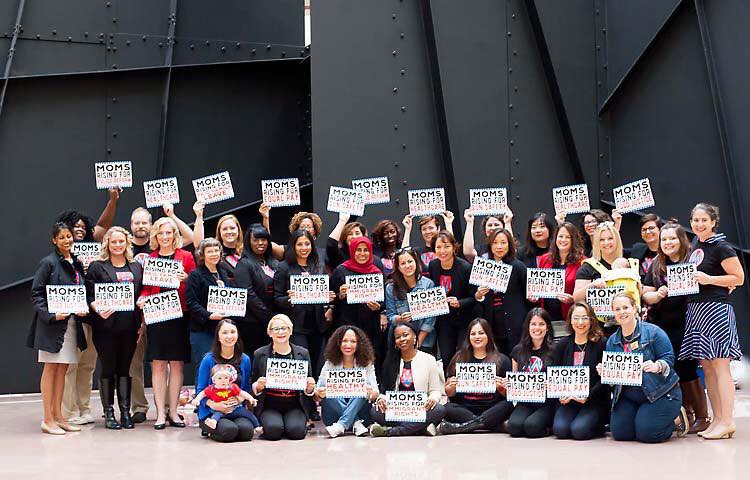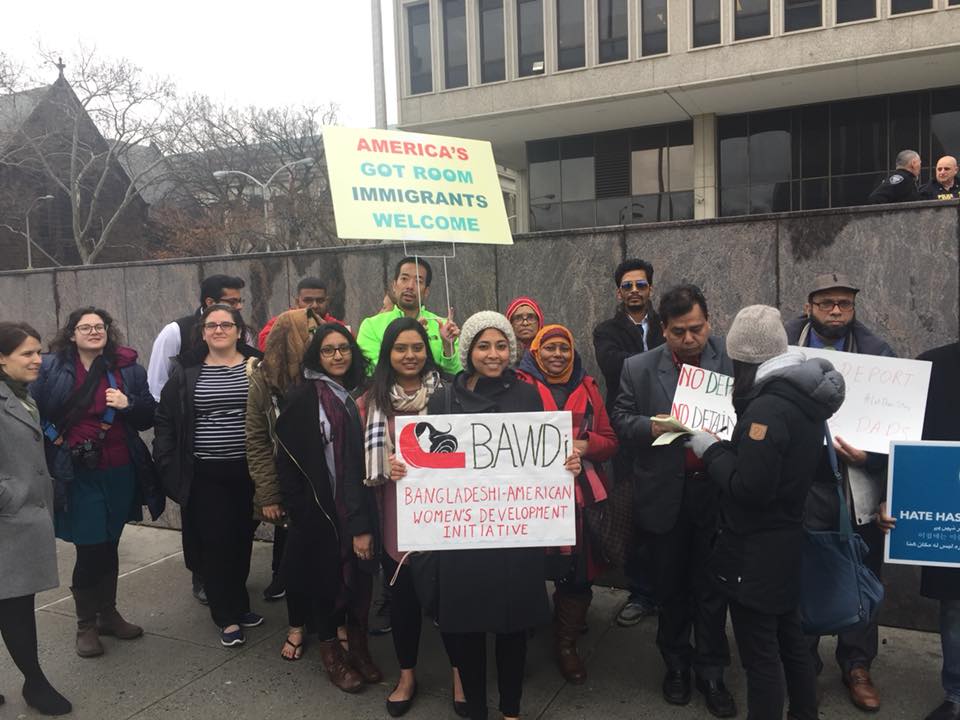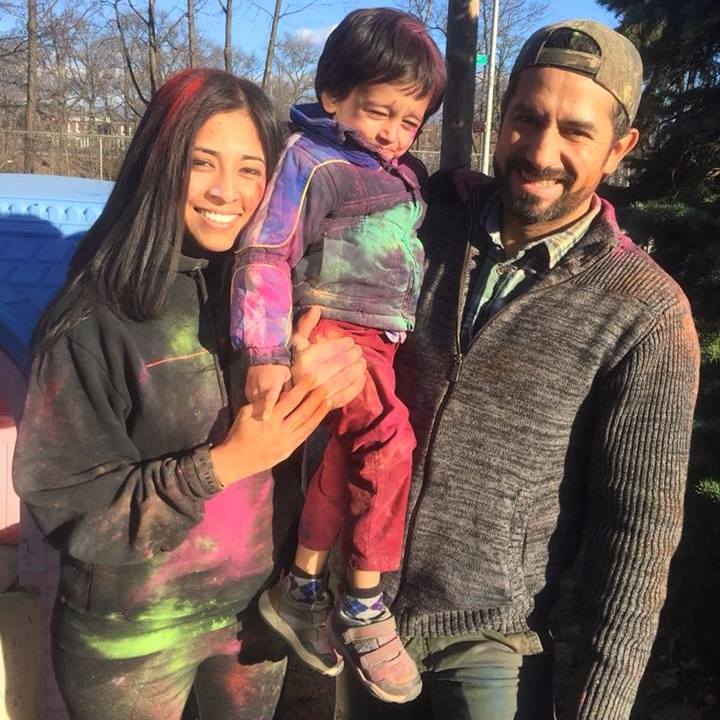[et_pb_section fb_built=”1″ _builder_version=”3.0.47″][et_pb_row _builder_version=”3.0.47″ background_size=”initial” background_position=”top_left” background_repeat=”repeat”][et_pb_column type=”4_4″ _builder_version=”3.0.47″ parallax=”off” parallax_method=”on”][et_pb_text _builder_version=”3.0.47″ background_size=”initial” background_position=”top_left” background_repeat=”repeat”]
Nadia is a Bangladeshi-American activist, organizer, blogger, advocate and mother based in NJ. She is the Maternal Justice Campaign Director at MomsRising, mother to a three year old son, serves on the board of the ACLU of New Jersey, is the co-founder of the Bangladeshi American Women’s Development Initiative (BAWDI) and a founding advisory board member of Inspiring South Asian American Women (ISAAW). All of the above might seem like a lot of hats to wear, but Nadia will be the first to tell you that everything she does feeds into a greater goal fighting for gender and racial justice.
What brought you to this work?
You could say I have always been interested in human rights and immigration because I was born into a situation where the topic came up regularly. My parents are immigrants that experienced a lack of systemic support on a variety of levels ranging from healthcare (mental and physical) to employment discrimination. Witnessing their experiences sparked in me a desire to contribute to my community and support families in a way that.
I was lucky because one of my first jobs after undergraduate was with Manavi. Believe it or not, it was there that I learned I’m a feminist for the first time! I had always identified with the traits of a feminism (advocating for women’s rights on the basis of the equality of the sexes), but it took that job and the exposure it provided for me to see that I had been a feminist all along without even realizing it! Manavi introduced me to women’s empowerment, immersed me in the South Asian activist community and gave me firsthand experience in advocating for the rights of women. It was a life changing experience and I felt empowered myself just getting to do that work.
Please tell me more about your work.
I believe that passion does not limit itself to a workspace and that I can impact change both inside and outside the office. I love what I do, and I do not set limits for myself. I work to hopefully make an impact and create positive changes both within grassroots movements and at higher policy levels.
I have been lucky to work around lots of community spaces on both the East and West coasts. I have been a youth organizer working in under-resourced communities of color. I’ve worked with diverse refugee communities which convinced me of the shortcomings of the model minority myth. It leaves so much out when it comes to the variety of experiences communities under the “Asian American Pacific Islander” identity go through. What I like about working with MomsRising is that I have the access to work on a national level to help shape policy, with my grassroots experiences informing my efforts. I feel like I am helping communities in a bigger space – mobilizing members around the country around federal and state policy.
On a more grassroots and personal level, my work at BAWDI feels like a lifelong dream realized. We founded this group when we saw a need for more support in the Bengali community in Paterson, NJ. We might not have a ton of resources on paper, but we have the priceless resources of passion, of coming directly from the community we are advocating for, and the skills and dedication to do the work to uplift our sisters and ourselves in the process.
What were some challenges?
When you do this kind of work you want to power through and say “I can do it” to everything and be everything to everyone all at once. As minority women, I think this is sometimes something we unfortunately carry as our baseline due to ingrained systemic oppressions. We tend to take on everything all the time. We join a million organizations and think we can do it all, but I do think – in terms of support – the reason we work so hard is because there are so many gaps and a lack of resources.
It’s not just money, but access to people – lawyers, press connections, hundreds of other supportive like-minded women out there. We need an army of of us to come together. I want to see more of these young women we are seeing today continue to come forward and also tap into the resources that are available from the previous generation. We can help them avoid the pitfalls we fell into. Hopefully, we can compound our experiences to build the steps to move forward, instead of starting from scratch every time.
I had to pinball around to get to where I am because the path in front of me wasn’t clear. I didn’t see someone who looked like me in the positions I aspired to be in, though later I was able to get support and guidance from incredible South Asian women activists like Deepa Iyer, Chaumtoli Huq and Nina Ahmad. Because of my early experiences of not having guidance, and seeing the impact of support from my mentors, I always try to give back! There was no “me” when I was growing up. But I don’t just believe that you can only “be what you see”, sometimes you have to forge that trail for yourself and for more importantly, for others.
What’s on your wishlist?
I, honestly, want more people like us … visible, engaged, brown women to be there for each other and be the influential changemakers that will make our world a better place.
What’s it like being a working mom?
For me personally, despite the challenges, I love my experience. I found the holy grail with MomsRising. I can work from home, they understand and value flexibility because most of us are actually mothers at MomsRising (though obviously it’s not a requirement whatsoever to work there!). I honestly don’t know many people who have this kind of work environment that enables this type of work/life balance in a supportive activist environment. Even if I wanted to, I couldn’t afford childcare. My mother watches my son when I can’t and she watched him full-time for two years before I joined MomsRising. My mom invested her time and labor into my son, that’s two years of emotional and mental labor without pay. It wasn’t just free for her to do that.
Back in the day women were expected to do childcare and housework. Now, we’re expected to do all of that, but also work full-time, while earning less than men for equal work. What has happened is expectation has gone up, but support has not. Just look at Tammy Duckworth. She is the first woman Senator to give birth while serving in Congress. Congress has been around how long? How is she the first woman to have this experience in 2018? Also, she is not going to get paid leave. Our entire system is still so archaic. This lack of systemic support cuts down our human capital and there’s no excuse for not fixing these gaps. It exasperates me when someone excuses this atrocity by saying ‘I didn’t give birth so I don’t feel like I need to support mothers’. I want to ask “Were you the only person in human history to pop out of a cabbage patch?!” If you exist, someone gave birth to you and it is not right that this act and women in general are so devalued!

What gives you hope?
I knew about the issues facing women and mothers in the workforce before I had a child but, now that I am a mother, it has become real on a different level. It feels like we are robbing women of their human capital and draining them of their potential. I feel angrier now that I’m a mother, but also feel my capacity for empathy has deepened from giving birth and raising a child. I was amazed to find that my ability to love expanded beyond my immediate family and son. My love gives me hope and strengthens my commitment to creating a better world, not only for my child but, for other families and their children too. I also find hope in the fact that women legislators – on both sides of the aisle – do support mothers and women in general. It just frustrates me that it takes a woman to advocate for other women (where are the men?) and that it has taken us so long to get into office, and even then we aren’t remotely close to parity.
Tell me about something that makes you proud.
I am very proud of BAWDI. It’s a very powerful effort. We are mostly all young women from the Bangladeshi community in NJ. I didn’t grow up in Paterson, though I did go there frequently to visit relatives and lived there for almost three years. Everyone from board either lived there or grew up close by and were part of the local community. We don’t have funding or monetary wealth but all of us are educated and we our respective resources and skills to get things done. We have formed a community of support that rallies together during tough times and celebrates the good times. Sometimes everyone comes together just to sing Bangla songs and share food and sometimes we rally together to fight for our women like Rojina Akter and her family.
Could you tell me more about Rojina’s case and what BAWDI did to support her?
Rojina is an undocumented mother of three children, one of whom is a DREAMer and one of whom is a US citizen. Rojina and her husband Hoque came to the United States in 2004 with their daughter, now 19, and son, Emon Faiman, now 15, after living for a couple of years in Botswana. They overstayed their tourist visa and applied for asylum a year later, citing politically motivated violence at home, but their application was rejected. After exhausting their appeals, they were issued a deportation order in 2007. In 2010, Akter said her husband was detained by immigration officials and spent 11 months at the Elizabeth Contract Detention Facility. At the same time, she was placed under supervision and fitted with an ankle monitor. In October 2011, Hoque was released and Akter’s bracelet was removed a few months later — all with no explanation. At their November check-in, immigration officers told them to return in February, an unusually short turnaround that alarmed the family. On Jan. 17, immigration officers knocked on the family’s fourth-floor apartment door and asked for Hoque. A few hours later, Hoque called his family and told them he had been detained while on his way to work. He was deported to Bangladesh very shortly after that, within a month of his detainment, along with 250 other South Asian men who were put onto a charter plane by ICE to Pakistan, India and Bangladesh. They were literally shipped out and dumped, ripping them away from their families and communities.
Rojina Akter was terrified that she would face the same fate as her husband. So we at BAWDI rallied together and held a press conference with partners and supporters outside the federal building on Broad Street in Newark, NJ, where Akter had her scheduled check-in with ICE officers. We came together to stand in solidarity with Akter, and also to draw attention to the plight of her family and of families around the country who are experiencing something similar. Our goal was that she return to her children and, thankfully, she did that day.

That’s incredible and leads me to my next question. What does resilience mean to you?
Resilience means power. When I say ‘power’, people think of money or physical strength or conquering, but power is the ability to survive and thrive with odds against you. Resilience is powerful women who have birthed children, their bodies fighting against nature, while still maintaining the strength to build communities, feed their kids, fight for their rights, create powerful bonds of friendship and sisterhood, while sharing resources and hope.
The word ‘resilience’ also makes me think of the Bangladesh genocide in 1971, and those who survived that atrocity with the odds stacked against them. Resilience makes me think of my parents who did survive and immigrated from Bangladesh to the U.S.. It makes me think of my childhood and how I moved every year of my life. I didn’t have a hometown and there were times we faced severe economic hardship. It makes me think of El Salvador’s Civil war, that lasted from 1980-1992, and my husband, who came from there to the U.S. because of it. My parents, my husband, and myself – we overcame our struggles to survive, thrive and work toward helping others. None of us were meant to survive, in fact, powerful countries and militaries worked their hardest to wipe us out. But here we are, our every breath is resistance, our every breath is proof that we are still here.
Resilience is taking what’s happened and using it to fuel you to make world a better place. Resilience isn’t always a choice. It is survival. I didn’t choose it, but it made me tougher and I am grateful for that.

Thank you for sharing so much with us, Nadia. We support and thank you for the great work you do.
[/et_pb_text][/et_pb_column][/et_pb_row][/et_pb_section]